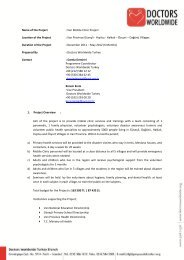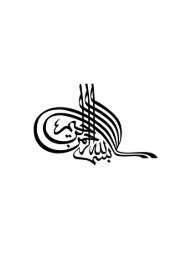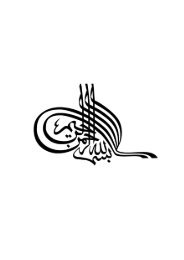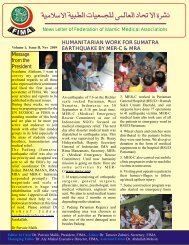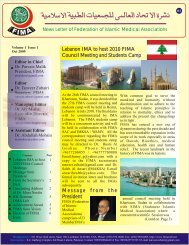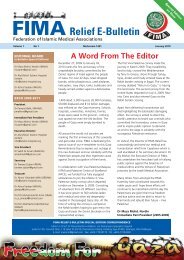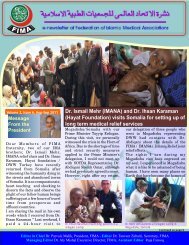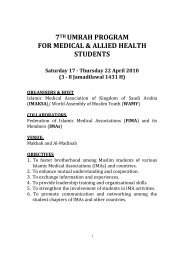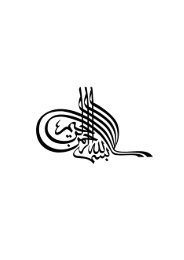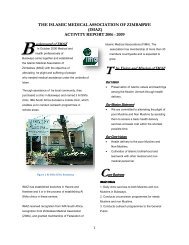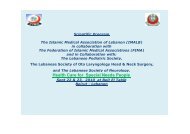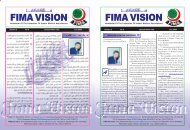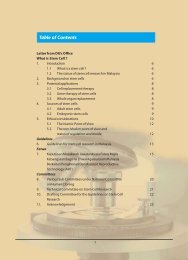FIMA Year Book 2009 - Federation of Islamic Medical Associations
FIMA Year Book 2009 - Federation of Islamic Medical Associations
FIMA Year Book 2009 - Federation of Islamic Medical Associations
Create successful ePaper yourself
Turn your PDF publications into a flip-book with our unique Google optimized e-Paper software.
Ethical Issues Related To<strong>Medical</strong> EducationIn The Light Of <strong>Islamic</strong> PrinciplesMuhammad Iqbal khan* , Rehan Ahmed Khan, Masood AnwarAbstract:Ethical dimension <strong>of</strong> <strong>Medical</strong> education necessitates a dedicated perception <strong>of</strong> explicit moralcodes, delivering medical knowledge and training <strong>of</strong> medical pr<strong>of</strong>essionals, not only atundergraduate and postgraduate levels, but till the end <strong>of</strong> one’s pr<strong>of</strong>essional life. Going back inhistory, we find that <strong>Islamic</strong> culture is most fascinating, complex, and dynamic in the world.<strong>Medical</strong> knowledge remained the vital part <strong>of</strong> learning objectives even as early as the time <strong>of</strong>Prophet Muhammad (PBUH). Muslim medical scholars contributed a great deal in impartingmedical knowledge to every student irrespective <strong>of</strong> race, religion or ethnic group. <strong>Medical</strong> ethicsis one <strong>of</strong> the important subjects stressed in modern age medical education. However, it is by nomeans the <strong>Islamic</strong> ethics. <strong>Islamic</strong> ethics is far superior than the “medical ethics” as it protects bothmedical practitioner and the patient, not only from the sins <strong>of</strong> worldly standards but those <strong>of</strong>divine standards too. Unfortunately medical ethics is not an essential part <strong>of</strong> medical curricula <strong>of</strong>most <strong>of</strong> the universities and medical schools. The learning behaviors and modalities <strong>of</strong> deliveringmedical education need certain ethical precincts. These ethical boundaries are well drawn by<strong>Islamic</strong> education system. During the selection process <strong>of</strong> a medical student and <strong>of</strong> a residentfor higher training, the main criterion should be that leaders <strong>of</strong> the future are being selected.Physicians may be leaders <strong>of</strong> people, whose moral principles and attitudes should be a role modelfor the society. The most significant constituent <strong>of</strong> an effective curriculum for a Muslim doctor isthe integration <strong>of</strong> behavioral changes based on truthful understanding <strong>of</strong> <strong>Islamic</strong> medical ethicalvalues. A curriculum is never inclusive and up to the mark if it is lacking fundamental ethicalissues pertaining to medical practice with special reference to faith, knowledge and practice <strong>of</strong>faith. <strong>Medical</strong> curriculum must also meet the requirements <strong>of</strong> the society. In Muslim countries,very little has been done in the postgraduate curricula and training programs. Though it hasbeen greatly emphasized in Islam to acquire knowledge at an incessant pace, little has been donefor continuous medical education and personal development <strong>of</strong> doctors. A medical teacher isfully aware <strong>of</strong> the fact that he is the responsible role model for his students and graduates. Allefforts and techniques to prepare and train a Muslim medical pr<strong>of</strong>essional will be fruitless, if theeducational environment and intellectual disposition <strong>of</strong> a medical educational institution andteaching hospital are not in accordance with <strong>Islamic</strong> teachings. The doctor must seek and advancehis knowledge until the end <strong>of</strong> his life. To attain an exceptional level <strong>of</strong> knowledge, continuingeducation is essential, so that the scholar’s knowledge will be functional for all communities.Keywords: Ethics, <strong>Islamic</strong> ethics, medical education, curriculum, continuing medical education.Muhammad Iqbal KhanMD; FRCS ( Eng); FRCS (Glasg); Dip Vas Surg (UK)Pr<strong>of</strong>essor and head <strong>of</strong> SurgeryIIMC/ Riphah University, Islamabad- PakistanE-mail: mikhandr@gmail.com<strong>FIMA</strong> <strong>Year</strong><strong>Book</strong> <strong>2009</strong>83




